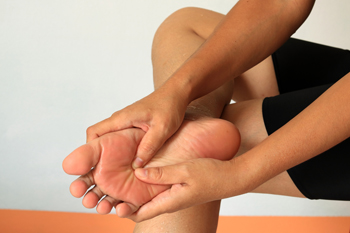Connect With Us
Blog
Items filtered by date: September 2020
Different Shoes For Various Sporting Activities
The type of shoes that are worn is important to consider while working out. An exercise routine may be hindered if shoes do not fit correctly, and potential foot problems may develop. There are different types of shoes that can be purchased for various sporting activities. Runners will benefit by knowing the amount of shock absorption that is needed, in addition to observing how the feet make contact with the ground. This can be identified by looking at old shoes, and noticing wear and tear patterns. For people that enjoy hiking, boots may be a better option than running shoes. It is beneficial if they are made of waterproof materials, and have adequate cushioning. If you have any questions about what type of shoes to purchase for preferred sporting activities, please consult with a podiatrist who can help you to make the right choices.
It is important to find shoes that fit you properly in order to avoid a variety of different foot problems. For more information about treatment, contact Dr. David Ungar from Personal Foot Care. Our doctor will treat your foot and ankle needs.
Proper Shoe Fitting
Shoes have many different functions. They cushion our body weight, protect our feet, and allow us to safely play sports. You should always make sure that the shoes you wear fit you properly in order to avoid injuries and deformities such as: bunions, corns, calluses, hammertoes, plantar fasciitis, stress fractures, and more. It is important to note that although a certain pair of shoes might be a great fit for someone else, that doesn’t mean they will be a great fit for you. This is why you should always try on shoes before buying them to make sure they are worth the investment. Typically, shoes need to be replaced ever six months to one year of regular use.
Tips for Proper Shoe Fitting
- Select a shoe that is shaped like your foot
- Don’t buy shoes that fit too tight, expecting them to stretch to fit
- Make sure there is enough space (3/8” to ½”) for your longest toe at the end of each shoe when you are standing up
- Walk in the shoes to make sure they fit and feel right
- Don’t select shoes by the size marked inside the shoe, but by how the shoe fits your foot
The shoes you buy should always feel as good as they look. Shoes that fit properly will last longer, feel better, and improve your way of life each day.
If you have any questions, please feel free to contact our office located in Farmington, MI . We offer the newest diagnostic and treatment technologies for all your foot care needs.
Why Live with Pain and Numbness in Your Feet?
What Factors Can Increase the Risk of Falling?
 Falls are the number one cause of injury and hospital visits due to trauma for people ages 65 and older. Various factors can increase one’s risk of falling including past falls, tripping, and falling hazards in the home and community, chronic diseases, taking multiple medications, having poor vision, balance problems, memory problems, depression, and behaviors like rushing. Problems with the feet and ankles, such as difficulty walking, weakness, or loss of sensation in the lower limbs, and wearing improper footwear can all increase the risk of falling as well. If you have foot or ankle issues, it is important to seek medical care from a podiatrist, who can diagnose and treat your condition and reduce your risk of falling.
Falls are the number one cause of injury and hospital visits due to trauma for people ages 65 and older. Various factors can increase one’s risk of falling including past falls, tripping, and falling hazards in the home and community, chronic diseases, taking multiple medications, having poor vision, balance problems, memory problems, depression, and behaviors like rushing. Problems with the feet and ankles, such as difficulty walking, weakness, or loss of sensation in the lower limbs, and wearing improper footwear can all increase the risk of falling as well. If you have foot or ankle issues, it is important to seek medical care from a podiatrist, who can diagnose and treat your condition and reduce your risk of falling.
Preventing falls among the elderly is very important. If you are older and have fallen or fear that you are prone to falling, consult with Dr. David Ungar from Personal Foot Care. Our doctor will assess your condition and provide you with quality advice and care.
Every 11 seconds, an elderly American is being treated in an emergency room for a fall related injury. Falls are the leading cause of head and hip injuries for those 65 and older. Due to decreases in strength, balance, senses, and lack of awareness, elderly persons are very susceptible to falling. Thankfully, there are a number of things older persons can do to prevent falls.
How to Prevent Falls
Some effective methods that older persons can do to prevent falls include:
- Enrolling in strength and balance exercise program to increase balance and strength
- Periodically having your sight and hearing checked
- Discuss any medications you have with a doctor to see if it increases the risk of falling
- Clearing the house of falling hazards and installing devices like grab bars and railings
- Utilizing a walker or cane
- Wearing shoes that provide good support and cushioning
- Talking to family members about falling and increasing awareness
Falling can be a traumatic and embarrassing experience for elderly persons; this can make them less willing to leave the house, and less willing to talk to someone about their fears of falling. Doing such things, however, will increase the likelihood of tripping or losing one’s balance. Knowing the causes of falling and how to prevent them is the best way to mitigate the risk of serious injury.
If you have any questions, please feel free to contact our office located in Farmington, MI . We offer the newest diagnostic and treatment technologies for all your foot care needs.
Signs of Peripheral Neuropathy
 Did you know that approximately half of all people with diabetes have some type of nerve damage? One of the most common types is peripheral neuropathy. Peripheral neuropathy typically starts in the nerves of the feet, and can affect both feet at once. The typical symptoms of peripheral neuropathy are tingling or a “pins and needles” sensation in the feet, foot pain or increased sensitivity, numbness and weakness in the feet, changes in the shape of the foot muscles and bones, and the appearance of open sores on the feet. Often, the symptoms are worse at night than they are during the day. If you are experiencing the symptoms of peripheral neuropathy, don’t ignore them. Schedule a visit with a podiatrist, who can help you maintain the health of your feet.
Did you know that approximately half of all people with diabetes have some type of nerve damage? One of the most common types is peripheral neuropathy. Peripheral neuropathy typically starts in the nerves of the feet, and can affect both feet at once. The typical symptoms of peripheral neuropathy are tingling or a “pins and needles” sensation in the feet, foot pain or increased sensitivity, numbness and weakness in the feet, changes in the shape of the foot muscles and bones, and the appearance of open sores on the feet. Often, the symptoms are worse at night than they are during the day. If you are experiencing the symptoms of peripheral neuropathy, don’t ignore them. Schedule a visit with a podiatrist, who can help you maintain the health of your feet.
Neuropathy
Neuropathy can be a potentially serious condition, especially if it is left undiagnosed. If you have any concerns that you may be experiencing nerve loss in your feet, consult with Dr. David Ungar from Personal Foot Care. Our doctor will assess your condition and provide you with quality foot and ankle treatment for neuropathy.
What Is Neuropathy?
Neuropathy is a condition that leads to damage to the nerves in the body. Peripheral neuropathy, or neuropathy that affects your peripheral nervous system, usually occurs in the feet. Neuropathy can be triggered by a number of different causes. Such causes include diabetes, infections, cancers, disorders, and toxic substances.
Symptoms of Neuropathy Include:
- Numbness
- Sensation loss
- Prickling and tingling sensations
- Throbbing, freezing, burning pains
- Muscle weakness
Those with diabetes are at serious risk due to being unable to feel an ulcer on their feet. Diabetics usually also suffer from poor blood circulation. This can lead to the wound not healing, infections occurring, and the limb may have to be amputated.
Treatment
To treat neuropathy in the foot, podiatrists will first diagnose the cause of the neuropathy. Figuring out the underlying cause of the neuropathy will allow the podiatrist to prescribe the best treatment, whether it be caused by diabetes, toxic substance exposure, infection, etc. If the nerve has not died, then it’s possible that sensation may be able to return to the foot.
Pain medication may be issued for pain. Electrical nerve stimulation can be used to stimulate nerves. If the neuropathy is caused from pressure on the nerves, then surgery may be necessary.
If you have any questions, please feel free to contact our office located in Farmington, MI . We offer the newest diagnostic and treatment technologies for all your foot care needs.
How Are Stress Fractures Diagnosed?
 A common reason for stress fractures of the feet to occur is from repetitive overuse. Many runners can experience this type of injury, and the bones in the center of the foot can be at risk. These types of fractures gradually occur as small breaks in the bone. The common symptoms that many patients can experience often include pain and discomfort in the front of the foot, tenderness surrounding the affected area, and it may appear to be bruised. Having an MRI taken is generally an effective method of diagnosing a stress fracture, and the average healing time is approximately six to eight weeks. It may be beneficial to perform certain types of stretches to promote healing, and many patients find it helpful to wear a walking boot. If you have pain in your foot, and think it may be a stress fracture, it is suggested that you speak to a podiatrist who can determine what the best course of treatment is for you.
A common reason for stress fractures of the feet to occur is from repetitive overuse. Many runners can experience this type of injury, and the bones in the center of the foot can be at risk. These types of fractures gradually occur as small breaks in the bone. The common symptoms that many patients can experience often include pain and discomfort in the front of the foot, tenderness surrounding the affected area, and it may appear to be bruised. Having an MRI taken is generally an effective method of diagnosing a stress fracture, and the average healing time is approximately six to eight weeks. It may be beneficial to perform certain types of stretches to promote healing, and many patients find it helpful to wear a walking boot. If you have pain in your foot, and think it may be a stress fracture, it is suggested that you speak to a podiatrist who can determine what the best course of treatment is for you.
Stress fractures occur when there is a tiny crack within a bone. To learn more, contact Dr. David Ungar from Personal Foot Care. Our doctor can provide the care you need to keep you pain free and on your feet.
How Are They Caused?
Stress fractures are the result of repetitive force being placed on the bone. Since the lower leg and feet often carry most of the body’s weight, stress fractures are likely to occur in these areas. If you rush into a new exercise, you are more likely to develop a stress fracture since you are starting too much, too soon. Pain resulting from stress fractures may go unnoticed at first, however it may start to worsen over time.
Risk Factors
- Gender – They are more commonly found in women compared to men.
- Foot Problems – People with unusual arches in their feet are more likely to develop stress fractures.
- Certain Sports – Dancers, gymnasts, tennis players, runners, and basketball players are more likely to develop stress fractures.
- Lack of Nutrients – A lack of vitamin D and calcium may weaken the bones and make you more prone to stress fractures
- Weak Bones – Osteoporosis can weaken the bones therefore resulting in stress fractures
Stress fractures do not always heal properly, so it is important that you seek help from a podiatrist if you suspect you may have one. Ignoring your stress fracture may cause it to worsen, and you may develop chronic pain as well as additional fractures.
If you have any questions, please feel free to contact our office located in Farmington, MI . We offer the newest diagnostic and treatment technologies for all your foot care needs.


